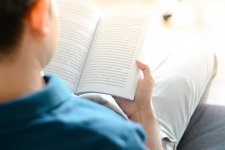Y
Yours
Guest
You move your lips while you read

There's a name for mouthing out words while you read: subvocalization. You might have picked up this habit as a child, while you were learning to sound out words, but it may actually impair your reading speed today. The University of Alabama's Center for Academic Success lists this and the actual vocalization of words as reading habits to break, due to a slowing of reading speed. How can you stop? Put your fingers on your lips or vocal cords to be more aware of it.
You read the last page of a book first

People who don’t do this think it sounds crazy—why would anyone want to know what happens at the end of the book before even starting it? But it turns out that people who “spoil” stories for themselves may actually have a more enjoyable time reading them, according to a study from the University of California at San Diego. If this is you, keep it up! (Just don’t ruin the endings for the rest of us!)
You smell your books

Reading is sometimes described as “having your nose in a book” so it's no wonder you may pick up on even faint odors within the pages. And odors there are: Researchers have found that books consistently have around 15 chemical compounds that waft out during testing, which show evidence of degradation of the ink and paper. Of course, a book can also pick up odors from its environment, such as moth balls, mildew, or ********* smoke.
You start books, but don’t finish them

According to Evan Gottlieb, PhD, an associate professor of English who penned a piece on the subject for the You do not have permission to view the full content of this post. Log in or register now., this might be happening because there are just so many other things to read, see, watch, and do. If your mind starts to drift while settling down to enjoy a lengthy classic you may follow your impulses. This jumping around may also be linked to our online reading behaviors, suggests Dr. Gottlieb. While reading online you often jump from link to link, sometimes from midway through a story. But when you stick with a book, your brain and body benefit
You trace each sentence with your finger

When you first started reading, you may have used your finger to follow the words, whether to help you keep your place in the text or even to remind you of which way your eyes should be moving across the page. (This is called directional tracking.) If you're in a distracting setting—such as in a noisy coffee shop—this habit might help you keep on track. But if you're engrossed in a book, drop the habit—which can slow down your reading speed—and let yourself get fully absorbed by your book.
You have multiple books going at once

Why choose one when you can read them all? The sheer volume of books available, especially electronically, makes selecting a single read to focus on a harder and harder task. As Julia Keller, a cultural critic for the Chicago Tribune described for a You do not have permission to view the full content of this post. Log in or register now., “...Some of us maintain a lively pile of books among which we just can't choose. So we don't. We read them all, and we read them all at once. We fish. We drift. We dabble. We sample. We leap between books, switching the targets of our attention span the way Peyton Manning mixes up the receivers to whom he aims his passes.” In the mood for a mystery? You pick one up. Ready to shift gears to a period piece? Add it to the pile.
You always read the book before seeing the movie

A poll on Goodreads.com found that 44 percent of its users would prefer to read the book first while only 6 percent would aim to see the movie first. (Other respondents answered variations on “it depends.”) The reasoning, as expressed by many commenters: Reading the book first gets you excited for the movie, but watching the movie first makes the book feel a little flat.
You read right over names of people and places you can't easily pronounce

It’s not often that we’re asked to read aloud as adults, which may be one reason that we never learn to enunciate the difficult names we encounter in text—we simply may never need to say them. But you may actually develop a bias against characters with hard-to-pronounce names: One study found that people view others with easy-to-pronounce names as more truthful than those with names that are harder to say.
You read a magazine from back to front

If you like reading meatier articles, you may instinctively know that these tend to be in the back of magazines. Or you may be reading back to front simply because you can. Magazines are often made up of many unrelated articles, so you could start at the front, back, or center and not miss anything by way of a plot or narrative. If this is one way you like to be spontaneous, go for it.
rd.com

There's a name for mouthing out words while you read: subvocalization. You might have picked up this habit as a child, while you were learning to sound out words, but it may actually impair your reading speed today. The University of Alabama's Center for Academic Success lists this and the actual vocalization of words as reading habits to break, due to a slowing of reading speed. How can you stop? Put your fingers on your lips or vocal cords to be more aware of it.
You read the last page of a book first

People who don’t do this think it sounds crazy—why would anyone want to know what happens at the end of the book before even starting it? But it turns out that people who “spoil” stories for themselves may actually have a more enjoyable time reading them, according to a study from the University of California at San Diego. If this is you, keep it up! (Just don’t ruin the endings for the rest of us!)
You smell your books

Reading is sometimes described as “having your nose in a book” so it's no wonder you may pick up on even faint odors within the pages. And odors there are: Researchers have found that books consistently have around 15 chemical compounds that waft out during testing, which show evidence of degradation of the ink and paper. Of course, a book can also pick up odors from its environment, such as moth balls, mildew, or ********* smoke.
You start books, but don’t finish them

According to Evan Gottlieb, PhD, an associate professor of English who penned a piece on the subject for the You do not have permission to view the full content of this post. Log in or register now., this might be happening because there are just so many other things to read, see, watch, and do. If your mind starts to drift while settling down to enjoy a lengthy classic you may follow your impulses. This jumping around may also be linked to our online reading behaviors, suggests Dr. Gottlieb. While reading online you often jump from link to link, sometimes from midway through a story. But when you stick with a book, your brain and body benefit
You trace each sentence with your finger

When you first started reading, you may have used your finger to follow the words, whether to help you keep your place in the text or even to remind you of which way your eyes should be moving across the page. (This is called directional tracking.) If you're in a distracting setting—such as in a noisy coffee shop—this habit might help you keep on track. But if you're engrossed in a book, drop the habit—which can slow down your reading speed—and let yourself get fully absorbed by your book.
You have multiple books going at once

Why choose one when you can read them all? The sheer volume of books available, especially electronically, makes selecting a single read to focus on a harder and harder task. As Julia Keller, a cultural critic for the Chicago Tribune described for a You do not have permission to view the full content of this post. Log in or register now., “...Some of us maintain a lively pile of books among which we just can't choose. So we don't. We read them all, and we read them all at once. We fish. We drift. We dabble. We sample. We leap between books, switching the targets of our attention span the way Peyton Manning mixes up the receivers to whom he aims his passes.” In the mood for a mystery? You pick one up. Ready to shift gears to a period piece? Add it to the pile.
You always read the book before seeing the movie

A poll on Goodreads.com found that 44 percent of its users would prefer to read the book first while only 6 percent would aim to see the movie first. (Other respondents answered variations on “it depends.”) The reasoning, as expressed by many commenters: Reading the book first gets you excited for the movie, but watching the movie first makes the book feel a little flat.
You read right over names of people and places you can't easily pronounce

It’s not often that we’re asked to read aloud as adults, which may be one reason that we never learn to enunciate the difficult names we encounter in text—we simply may never need to say them. But you may actually develop a bias against characters with hard-to-pronounce names: One study found that people view others with easy-to-pronounce names as more truthful than those with names that are harder to say.
You read a magazine from back to front

If you like reading meatier articles, you may instinctively know that these tend to be in the back of magazines. Or you may be reading back to front simply because you can. Magazines are often made up of many unrelated articles, so you could start at the front, back, or center and not miss anything by way of a plot or narrative. If this is one way you like to be spontaneous, go for it.
rd.com
Attachments
-
You do not have permission to view the full content of this post. Log in or register now.